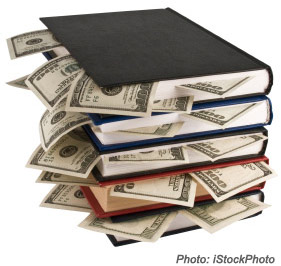How Much Money Do Authors Make?
Short answer: If you’re a non-celebrity, usually between $10,000 – $50,000. That’s assuming that your book doesn’t sell past your advance.

The standard pay for authors is a 15% royalty on the cover price. When all is said and done, it averages out to about $1 per book sold.
Before you get too excited, you should know that overall, less books are probably sold than you think. Every year, around 500,000 new books are released: half from publishers, and half self-published. Of those, only 10 percent will ever sell more than 500 copies! Insane, right? In 2008, only 9 new books sold more than a million copies. Only 9. And only 41 sold more than 100,000 copies.
Books are generally called a “success” if they sell at least 7,500 copies. And even the Big Six publishers usually only make a profit on every 1 in 7 books! Don’t feel bad for them because it’s a huge, huge profit they do make off the 1 in 7 books.
(PS– This is another reason it’s imperative to have an agent. It’s not that hard to get one of the half-a-million book deals. It is hard, however, to make your book stand out in the crowd, to make sure the publisher is promoting it, and to make sure it’s actually in the stores! Agents will also negotiate to get you the biggest advance, which the majority of the time is the only money an author ever sees.)
The Advance
Since the accounting for the sale of books takes years, the publishers are nice enough to give the author “an advance” on their hopefully upcoming royalties. It’s a gamble the publisher makes though, because the author never has to pay back the advance, even if the book bombs.
So let’s say you get a $10,000 advance. So very generally, for the first 10,000 books sold, you won’t get paid anymore. After your advance “pays out,” you will start seeing checks. However, Wall Street accounting being what it is, you won’t likely see checks for 2 years or more, and mysterious things can happen to the money you thought you were owed. The best thing for most authors is the get the biggest upfront advance possible (again, why you need an agent).
Should you score a $20,000 advance, and your book only sell 15,000 copies, you won’t have made back your advance, but you don’t have to repay it.
How You Are Paid
Here’s another tricky bit to publishing that an agent can help you navigate: how you are paid. The publisher agrees to a nice advance to your book, but most of them won’t give you the check in one lump sum. To help defray their costs, they’ll spread it out as long as possible (or as long as you will allow them to). The standard way to get paid is 1/3 of the advance upon signing the book deal contract, 1/3 of the advance upon turning in a completed manuscript (that’s after it’s gone through their copyediting and your final revisions), and the final 1/3 upon the publication date (which could be a year or more away!).
I know many authors without agents though that get paid on a much longer calendar: 1/6 at contract signing, then 1/6 at ms turn-in, and the rest petered out after publication with dates like “on the 1-year anniversary of publication.” You want to avoid this.
What You Must Pay For
Finally, there is also the details of who pays for what. Most cookbooks require a team of people: a photographer, food stylist, sometimes a professional writer or editor, a recipe tester, even a nutritionist. Every contract is different, and sometimes the publisher will pay for things, and sometimes they make the author pay. It’s very, very important to know what you’re expected to pay for. You won’t be celebrating a $50,000 advance once you figure out you’re responsible for paying $30,000 to a professional photographer and $10,000 to a food stylist!
For my first book, a baby product guide book, I had envisioned a small, hand-drawn picture of every item next to my review. When I turned in the massive manuscript, the editor asked for my images. My images? I thought someone in the publisher’s design department was going to do that. I thought wrong. Since I can’t actually draw a circle, I had to scramble to find a cheap illustrator who wasn’t going to eat up my entire advance. I did find someone wonderful in Siberia (I’m not kidding), but it was an expensive lesson learned.
A lot of publishers, to cut costs, are having authors take their own photos. This can make for an absolutely beautiful book, but before you agree, really evaluate the costs. If you agree to take your own photos, not only is that a huge undertaking, but you are responsible for buying all the ingredients, the props, making the food, styling it, and then photographing it. And if the publisher doesn’t like the photos, you have to shoot them again.
<< BACK TO: Guide to Getting Your Own Book Published
3 Pingbacks